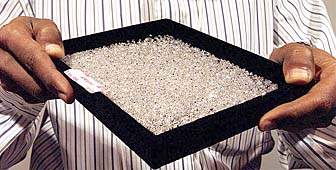
Switzerland steps up checks on “dirty” diamonds

The Swiss government is to introduce more stringent measures to prevent the trafficking of the diamonds, which are helping to fuel the civil wars in Angola and Sierra Leone.
In December, Switzerland was identified by the United Nations as one of the main centres for the trade in illicit diamonds, an accusation which prompted an angry Swiss response. The Swiss Ambassador to the UN, Jenö Staehlin, accused the UN of failing to take account of the measures Switzerland had put in place.
Now the Swiss, stung into further action, are introducing even tougher measures which go beyond the guidelines laid down by the UN.
“We have no desire to be a centre for such a dubious trade,” says Roland Vock, of the State Secretariat for Economic Affairs (Seco). “We will fight any abuse of the Swiss diamond market.”
The United Nations Security Council has banned the import of diamonds from Angola and Sierra Leone because rebel groups there are using gems mined in areas under their control to finance their wars.
Last July, the UN Security Council passed a resolution placing an embargo on all diamonds from Sierra Leone, which did not have a UN-approved certificate. It imposed a similar ban on diamonds coming from areas controlled by Unita rebels in Angola in June 1998.
Switzerland is an important centre for the diamond trade, and the world’s leading diamond producer, De Beers, has one of its main international centres in Lucerne.
Officially, the country imports very few uncut diamonds. Yet reports suggest it has been an important transit point for these rough stones. For example, some 41 per cent of the rough diamonds imported into Britain in 1999 were declared as being of Swiss origin.
Part of the reason for this is that the free ports at Zurich and Geneva airports were abused in order to “launder” stones of dubious origin.
Unlike stones entering the Swiss customs area, gems from Sierra Leone or Angola entering the free ports could be added to other batches of legitimate stones without their documentation being checked.
“As a result, we have no statistics about the number of rough diamonds passing through customs warehouses,” Vock explained.
It is this unregulated situation that the Swiss authorities have acted to stop. From March 1, they will demand a complete inventory of all diamonds passing through customs warehouses, as well as declarations of provenance and origin of all stones.
“By putting the transit of rough diamonds from Sierra Leone through customs warehouses under prohibition, Switzerland has gone beyond what is required by the United Nations,” said Vock.
He added that the problem of transit through customs warehouses is an international problem: “But to my knowledge, Switzerland is the only country which has done something about it.”
Seco is also expanding the number of “sensitive” African countries, which are thought to act as transit countries for illicit diamonds from Sierra Leone. The list will be increased from seven to 15 states.
“Switzerland has brought in new measures to control the trade in these diamonds. It is important that other countries follow suit,” Vock said.
He said that Switzerland was wholeheartedly behind plans to introduce a forgery-proof international certification regime.
by Roy Probert

In compliance with the JTI standards
More: SWI swissinfo.ch certified by the Journalism Trust Initiative





























You can find an overview of ongoing debates with our journalists here . Please join us!
If you want to start a conversation about a topic raised in this article or want to report factual errors, email us at english@swissinfo.ch.